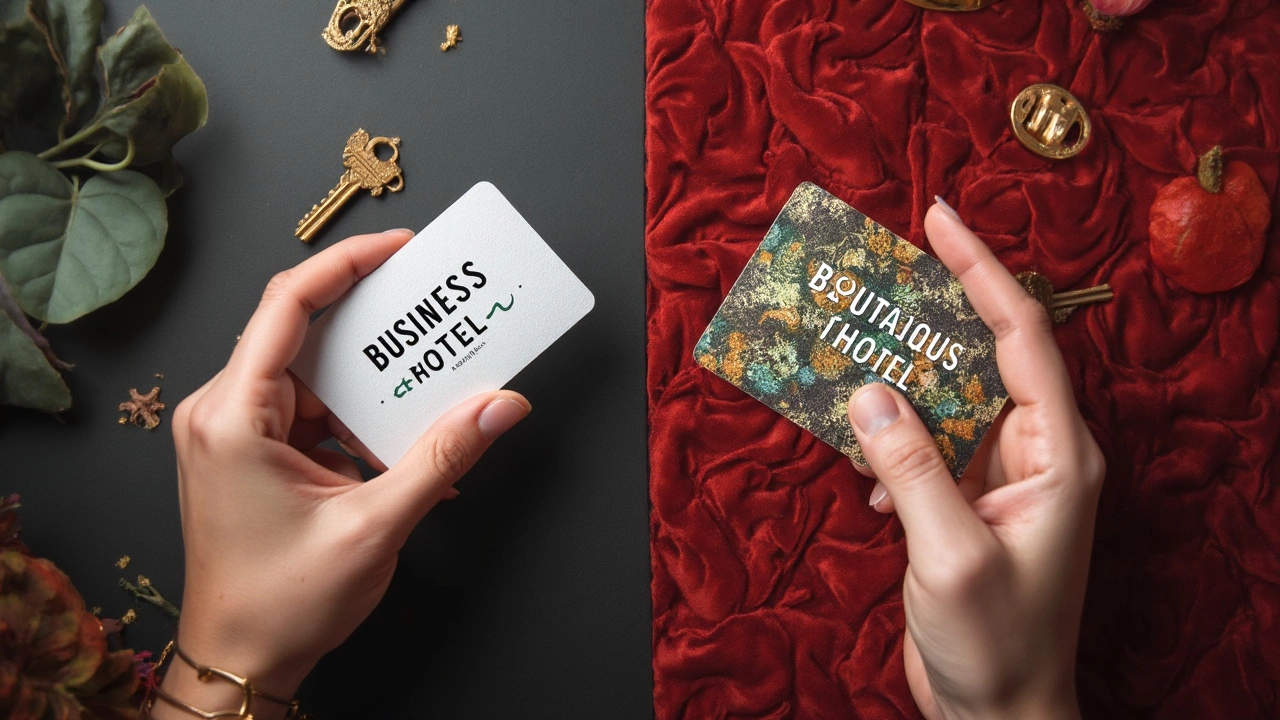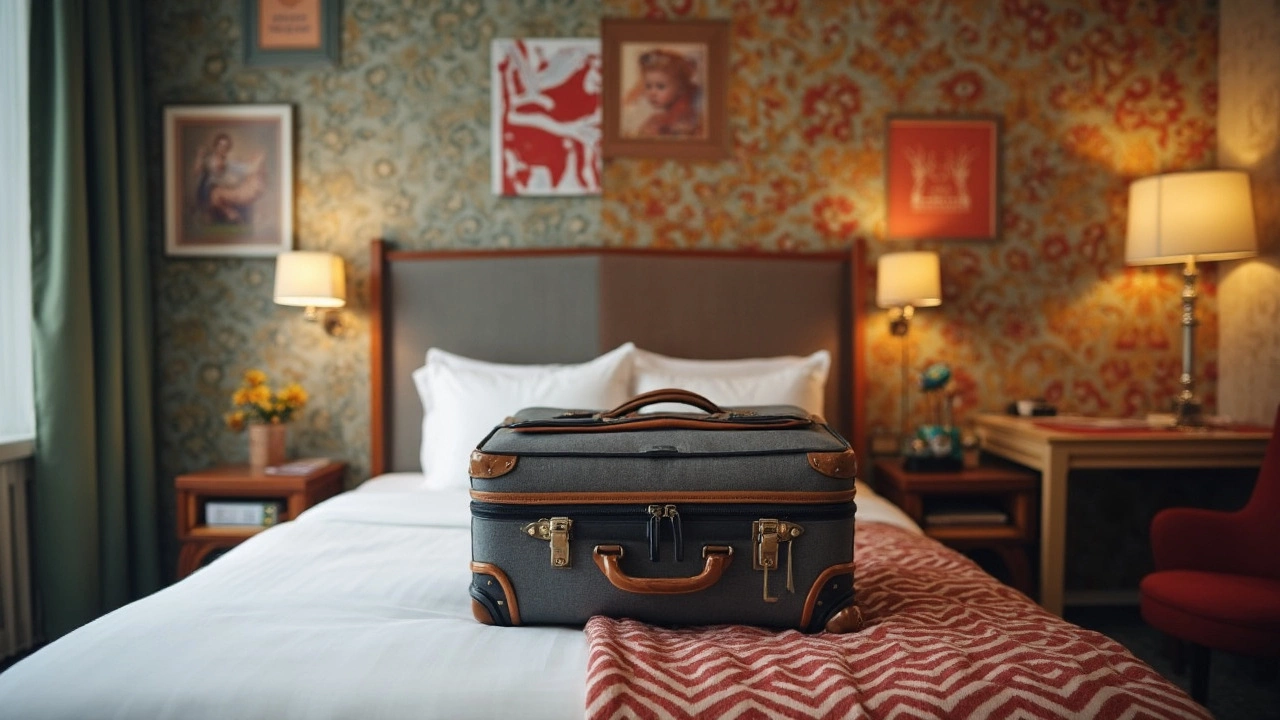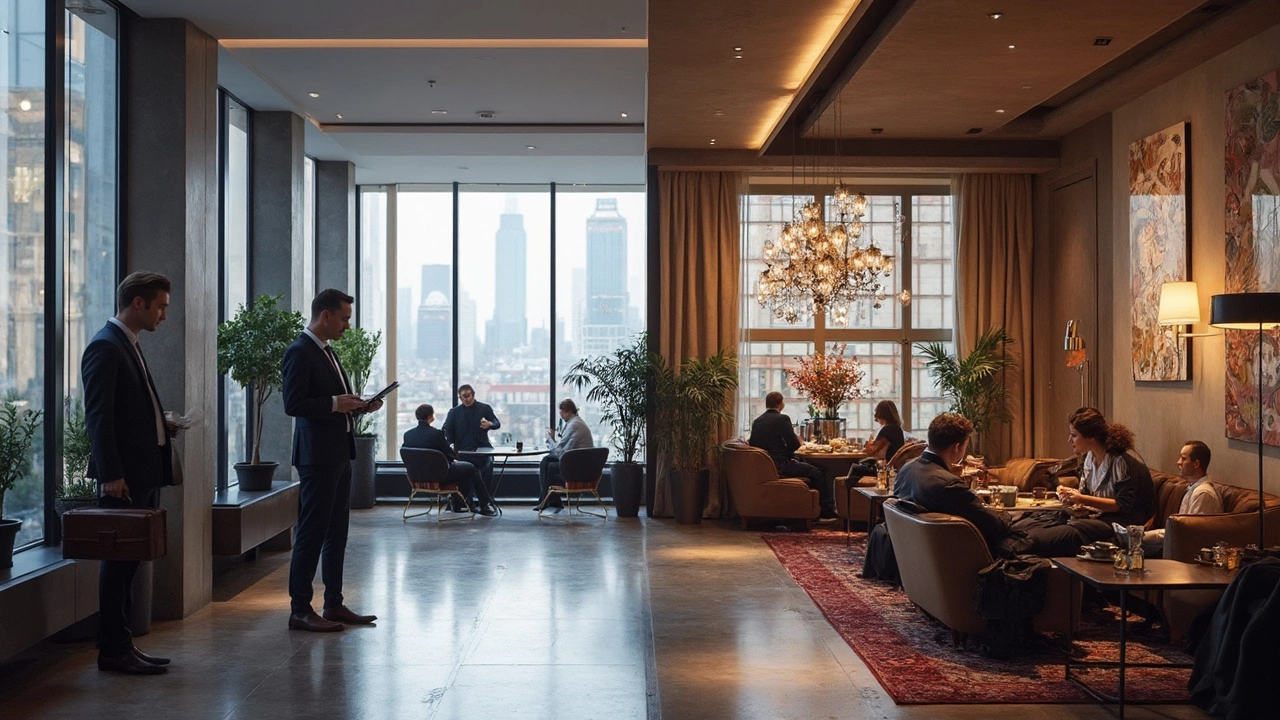Ever booked a hotel and instantly thought, “Well, this was made for meetings,” or maybe, “Wow, this place definitely wants me to Instagram everything”? You probably landed in either a business hotel or a boutique hotel. People use these terms a lot, but the lines often get blurred, especially now that everyone is chasing some version of ‘work meets play’ when they travel. Knowing the difference will save time, money, and possible disappointment on your next trip.
Let’s clear this up: business hotels are designed for one mission—making work trips smoother. They’re packed with reliable Wi-Fi, big desks, early breakfast, and conference rooms. Meanwhile, boutique hotels crank up the personality. Think themed rooms, unique décor, or maybe a lobby that feels more like a trendy café than a check-in zone. If you travel a lot (I do, and it’s wild how quickly you feel the vibe at check-in), getting these differences down will help you find your new favorite stay—whether you’re traveling for work, pleasure, or a bit of both.
- What Defines a Business Hotel?
- The Boutique Hotel Experience
- Key Differences: Services, Ambiance, and Guests
- Which Hotel Fits Your Trip?
- Tips for Choosing the Right Hotel
What Defines a Business Hotel?
A business hotel is all about keeping work-life running as smoothly as possible for travelers who need to get things done. You’ll spot these hotels often in city centers, business districts, or close to airports—places where time is money and convenience is critical. Chains like Marriott, Hilton, and Hyatt almost always have a “business” version in their lineup. If you check in during the week, you’ll probably notice most of the guests are rolling up with laptops and suit jackets instead of beach towels.
What makes these places stand out? Here’s what you can generally expect:
- Practical room setups: Spacious desks, ergonomic chairs, fast and reliable Wi-Fi, and lots of charging ports. You can take a conference call or crank out a report without any hassle.
- Meeting facilities: Conference rooms, boardrooms, and business centers are standard. Some even offer on-demand printing and mail services.
- Flexibility: Early breakfast starts (think 6:00 AM buffets), room service at odd hours, and express check-in/check-out. They get that your schedule might not fit the “vacation” mold.
- Location perks: Walking distance to major offices, convention centers, or airports. Less sightseeing, more streamlining.
- Loyalty programs and extras: If you travel a lot for work, the points rack up fast. Many business hotels offer club lounges with free snacks and drinks for frequent guests.
For some hard numbers, check out this quick snapshot of business hotels compared to regular hotels:
| Feature | Business Hotel | Typical Regular Hotel |
|---|---|---|
| Wi-Fi Speed (Mbps) | 50-200 | 10-50 |
| Breakfast Start Time | 6:00 AM | 7:30-8:00 AM |
| Meeting Rooms per 100 Rooms | 5-8 | 1-2 |
| Loyalty Points Earned (avg/night) | Up to 2x higher | Standard rates |
If you want work to roll on with as few bumps as possible, business hotels are set up for exactly that. They skip extra fluff and focus on what a traveler on the go really needs.
The Boutique Hotel Experience
If you’ve ever walked into a boutique hotel, it’s hard not to notice how different it feels right away. These spots put personal touches front and center—local art on the walls, quirky furniture, and service that feels miles away from anything cookie-cutter. You might even meet the owner at breakfast. While a boutique hotel can be just as comfortable as a big chain, it usually skips the mass-market look to create something way more memorable.
One big deal with boutique hotels: size. Most have fewer than 100 rooms, which means less foot traffic and a lot more focus on guests. According to a 2024 report from STR Global, 78% of boutique hotels are in city centers or ‘cool’ neighborhoods with local shops and restaurants right outside the door. That grabs travelers who actually want to get a real taste of the city, not just fly in and out for meetings.
Services and amenities usually go beyond free soap and Wi-Fi. Some boutique hotels partner with local chefs for in-house restaurants or host live music in the lobby. Vibes change from one place to the next: you could stay in a converted firehouse in New York or a beach cottage in Miami. The goal is always to feel different from the bland sameness you’ll get at big business chains. Here’s what really stands out:
- Unique themes and décor—think custom murals, artisan furniture, and sometimes wild room layouts
- Locally sourced food and drinks
- Personalized service—staff actually notice (and remember) your preferences
- Cozy, social spaces like rooftop bars or secret courtyards
- Community events, art shows, or yoga classes that mix locals with guests
For travelers looking for numbers, check out this breakdown of typical features:
| Boutique Hotel Feature | Average Occurrence |
|---|---|
| Rooms Under 100 | 95% |
| Local Artwork & Design | 88% |
| Craft/Local Food & Drink | 80% |
| Personalized Guest Services | 92% |
| Community Events | 60% |
So, if making your trip feel special and connected to the city is your thing, boutique hotels win. Just don’t expect a conference room on every floor or a dozen elevators. Every stay is a little experiment in local culture.

Key Differences: Services, Ambiance, and Guests
Once you walk into a business hotel, the difference hits you right away. You’ll see lots of people in suits, probably typing away at laptops or talking quietly on the phone. These hotels stick to business basics: quick check-in, 24/7 front desk, laundry that’s fast, and breakfast ready before sunrise. The whole place is geared toward getting people in and out efficiently, no fuss, no wasted time.
Boutique hotels, though? Total 180. You might step into someplace that feels like a cross between a hip café and an art gallery. Staff are often way more relaxed, and the crowd is mixed—young couples, friends on a girls’ trip, sometimes families, or travelers who pick hotels by style, not location. Service gets personal here—some boutique hotels will remember your name, favorite drink, or give you tips about the coolest local spots.
Here’s a concrete breakdown:
| Feature | Business Hotel | Boutique Hotel |
|---|---|---|
| Target Guest | Business travelers, conference attendees | Leisure travelers, style-seekers |
| Ambiance | Professional, predictable | Unique, often quirky or themed |
| Typical Services | Conference rooms, fast Wi-Fi, business center, express check-in/out; early breakfast | Curated experiences, local artwork, custom minibars, personalized service |
| Hotel Size | Usually large (100+ rooms) | Usually small (10-100 rooms) |
| Location | City centers, financial districts, near airports | Trendy neighborhoods, historic areas |
Another thing: business hotels usually have loyalty programs that reward frequent stays with free nights or perks, which is great if you’re traveling for work all the time. Boutique hotels aren’t always part of big chains, so perks are more about the experience—maybe a local wine on arrival, or exclusive access to a rooftop bar.
If you’re a light sleeper, here’s a tip: business hotels tend to be quieter at night since guests crash early for next-morning meetings. Boutique hotels sometimes host pop-up parties or have buzzing bars, so noise can be an issue. When you book, always check reviews for noise or ask the hotel directly about the vibe after dark.
To sum it up, business hotels are all about convenience and reliability, while boutique hotels are about personality and making your stay memorable—sometimes at the cost of predictability or silence. Pick what matches your travel goals and comfort zone.
Which Hotel Fits Your Trip?
If you’re stuck picking between a business hotel and a boutique hotel, the right choice depends on what you actually need from your stay. Start by asking: why are you traveling, and what do you care most about—efficiency, comfort, atmosphere, or getting work done?
For work-heavy trips, business hotels usually win. They’ve got fast, reliable Wi-Fi (according to a 2024 Expedia survey, 92% of business hotels offer guaranteed high-speed internet), bigger desks, printing stations, and early-morning breakfast buffets. You’ll likely be closer to conference centers or corporate offices—saving you from long commutes. Business hotels also tend to have gyms, basic but solid restaurants, and quick check-in/check-out. If you’ve got meetings all day or need to sneak in work calls without background noise, these spots just work better.
If your trip has a more relaxed schedule or you want to add a dash of fun, consider a boutique hotel. These places usually have more personality, cool architecture, and locally inspired décor. Some offer perks like custom welcome gifts or curated city guides. They’re perfect for creative recharge or mixing business with sightseeing. According to PKF Hospitality’s recent report, the average boutique hotel scores 25% higher on guest satisfaction surveys when it comes to style, uniqueness, and atmosphere.
Here’s a side-by-side comparison to make things simple:
| Feature | Business Hotel | Boutique Hotel |
|---|---|---|
| Location | Business districts, near transport hubs | Trendy neighborhoods, historic areas |
| Room Design | Functional, standard décor | Unique, customized rooms |
| Amenities | Fast Wi-Fi, meeting rooms, basic gym | Local touches, personalized service |
| Breakfast | Early, buffet-style | Often à la carte, local ingredients |
| Average Price | Often mid-range, discounts for loyalty | Can be higher, but varies by city |
Still not sure? Here are some quick rules of thumb:
- Traveling for a conference, interview, or packed work schedule? Go business hotel.
- On a creative trip, vacation, or want a memorable stay? Try a boutique hotel.
- Need consistent services and no surprises? Business hotels stick to routine.
- Craving local flavor and Instagrammable spaces? Boutique hotels are worth the splurge.
So, match the hotel to your needs. There’s no one-size-fits-all answer, but knowing what you want makes the choice a whole lot easier—and lets you get on with the trip instead of second-guessing your booking.

Tips for Choosing the Right Hotel
Picking the right hotel isn’t just about price or a nice photo online. There are real differences between a business hotel and a boutique hotel, and knowing when to pick each makes all the difference on your trip.
Here are some concrete tips that help frequent travelers (myself included) avoid headaches and pick the hotel that fits:
- Know your top priorities. If you’re on a work trip and need 6 a.m. coffee, fast Wi-Fi, and printing options, business hotels almost always deliver. But if memorable aesthetics, locally inspired rooms, and personal service sound better, boutique hotels win.
- Check the review sites (the real ones). Scan recent reviews on big platforms, but also smaller ones like Oyster or TripAdvisor forums. Consistent complaints about noise, unreliable internet, or location are red flags—especially if you need to work.
- Look for loyalty perks. Big chain business hotels may offer points, which can translate to free upgrades or even future free stays. Boutique hotels might have quirky in-room treats or flexible check-in, but points usually aren’t the focus.
- Location matters. Business hotels are usually close to major business districts, transit hubs, or convention centers. Boutique hotels might tuck themselves into trendier neighborhoods, sometimes away from work but closer to restaurants and nightlife.
- Compare the real costs. Boutique spots may look cheaper until you add breakfast, Wi-Fi, or late check-out fees. Sometimes the "all-in" pricing at a business hotel is less of a surprise at checkout.
Hotel booking data from 2024 showed this breakdown for average amenities at major hotel types:
| Amenity | Business Hotels | Boutique Hotels |
|---|---|---|
| 24/7 Gym | 90% | 45% |
| Meeting Rooms | 95% | 20% |
| Complimentary Breakfast | 82% | 38% |
| Unique Room Decor | 20% | 94% |
If you want an insider perspective, check this out:
"For business travelers, small things—like having an iron ready or breakfast starting before 7 a.m.—can make or break the experience. But for some guests, the local flavor and charm in boutiques are worth skipping those extras." — Daniel Craig, travel industry expert, via Skift’s 2023 Hotel Trends Report
Bottom line: think about what makes you productive (or relaxed), check those real-life reviews, and don’t just go for the prettiest Instagram shot. Business and boutique hotels each have their own perks—the right one just depends on what matters most for your stay.
